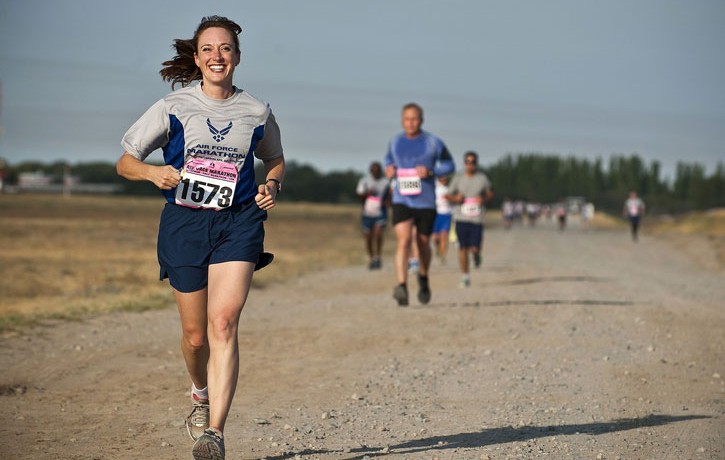in Nutrition
Running a Marathon? Revise Your Diet for Optimum Performance

Are you training for a half-marathon or marathon?
Are you exercising most days?
Are you properly nourished to get the best from your body?
You may be a seasoned (or a budding?) athlete who knows all about the right diet for training and performance. Still, a little refresher can’t hurt, so here are the basics of current nutritional advice for athletes.
Eat Real Food
This is a rule for whatever it is you are doing, even if you were not exercising at all: Eating ‘clean’, i. e. real food, is the basis for good health. Your diet should predominantly consist of fresh fruit and vegetables, wholegrains, nuts and seeds, beans and pulses, and potentially dairy, eggs, meat and fish. If you are a vegetarian or vegan, the last two or four items will not be on your menu, which is fine, too. Some very successful athletes are vegans. The main thing is that your diet consists of lots of whole, fresh foods. Having said that, because you are an athlete and exercise regularly, you can get away with the odd digression from this healthy regime more easily than people who do not exercise, but it really should be occasional.
Energy
Check that you eat enough calories to cover your expenditure to make sure that you can improve your performance while still staying healthy. How many calories you need depends on your genes, sex, age, weight, body composition, your activity level and your training programme. If you are curious about your body composition, book an appointment with our nutritionist who can carry out a body composition analysis for you and help you calculate your caloric requirements.
Carbohydrates
For decades, carbohydrates have been emphasised as the main macronutrient for endurance athletes, as it carbohydrate foods are what the body uses to replenish our glycogen stores – the emergency store of energy in the form of starch that we keep in the liver and muscles. Current advice is to take in 5-7 g of carbs per kilogram of body weight daily for people who train at moderate intensity (approx. 1 h/day); 7-12 g/kg BW for people who train at moderate to high intensity (approx. 1-3 h/day) and 10-12 g/kg BW for anyone who follows a very high intensity training (>4 h/day).
However, there are some very profound and interesting developments going on at the moment. In a nutshell, leading scientists in sports nutrition are now casting doubt on the conventional recommendations. Is a high-carb diet really the way to go? High-carb diets are implicated in heart disease and diabetes, and high activity levels may not compensate for that. Would endurance athletes actually be better of with a low-carb diet? More research is still needed here, but we will write in more detail about this soon.
Carbohydrate foods are sugars, all grains and cereals (bread, pasta, rice, oatcakes etc.), beans and pulses (which are also a good source of protein), fruit, and starchy vegetables, such as potatoes, sweet potatoes, carrots, parsnips and suede.
Protein
During digestion, proteins break down into amino acids, which are the building blocks for all enzymes and antibodies, as well as hormones. They are also required to build and repair body tissues including muscles. If you are an athlete, you need more protein than non-athletes. Current recommendations are 1.2-1.7 g protein/kg body weight/day, e. g. 84-119 g for somebody who weighs 70 kg.
To fully benefit from your protein, don’t eat it all in one or two sittings, but space it out over the course of the day. Combining protein with carbohydrate speeds up the replenishment of glycogen stores while at the same time avoiding blood sugar spikes and thus the secretion of too much insulin.
Protein foods are meat, fish, eggs, dairy, beans and pulses, Quorn, tofu, tempeh and other soya foods, nuts and seeds (which are also a source of fat).
Fat
Don’t avoid fat. You do need some fat, and depending on how the research into low-carb diets vs high-carb diets is going, researchers may soon recommend to considerably up your intake at the expense of carbs. Fat is needed for insulation, the brain, nerve sheaths and bone marrow and is a crucial part of the structure of all cell membranes. Furthermore, fat carries and stores fat-soluble vitamins: A, E, D, and K, and it is also a source of energy. Current recommendations for athletes are to eat between 20-35% of total calorie intake.
What matters, is that these fats come from the right sources: Avoid trans-fats at all cost! These are processed, toxic fats that you will mainly find in margarines and shop-bought baked goods such as cakes, biscuits and cookies, as well as deep-fried foods such as crisps. On ingredients lists, these will show as “(partially) hydrogenated fats”.
Ideally, most of your fat intake should come in the form of omega-3 fats (oily fish, omega-3 eggs, game or grass-fed organic meat, seafood, walnuts, almonds, ground linseeds and chia seeds) and mono-unsaturated fats, such as avocado and olives. Saturated fats – these are fats solid at room temperature, e. g. butter and coconut oil – withstand heat better than vegetable oils and should be used for frying. Omega-6 fats (mass-produced meat and dairy, baked goods) are not necessarily bad, but most of us have too much omega-6, and this has an impact on your levels of omega-3.
Nutrition Information
Note that 119 g of protein does not equal 119 g of steak, for example. Different foods contain different amounts of protein, carbohydrates and fats. You can use this online database to find out: http://nutritiondata.self.com.
- Consult Your Body’s Inner Wisdom - 25th September 2025
- Unpacking Misconceptions About Deep Rest Meditation - 26th August 2025
- The Missing Piece in Wellness? Why Realization Process Offers More Than Mindfulness - 22nd July 2025
